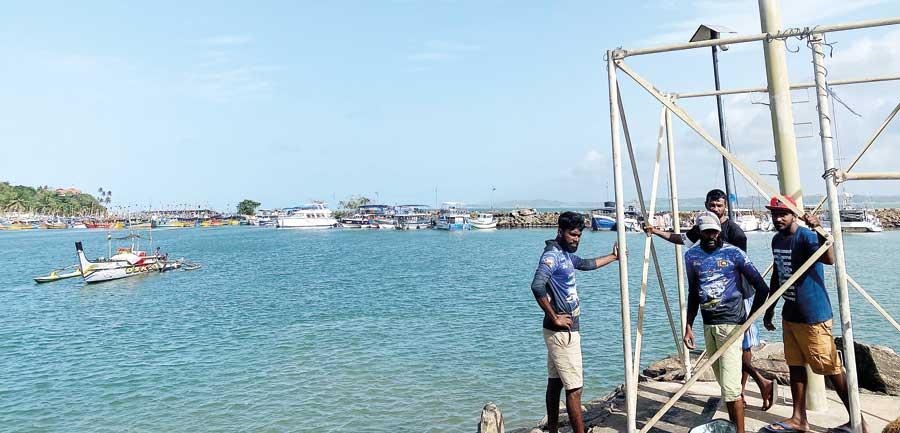Reply To:
Name - Reply Comment

They set out daily and supply the Fish needed for daily consumption. Therefore the most impacted are the boat owners operating their vessels running on kerosene oil
Pix by Dinuli Francisco
- For each boat to sail and return the same day, at least 20 litres of kerosene are required
- The fisheries sector, directly and indirectly, supports close to one million people in Sri Lanka
- The fish and fisheries sectors contribute about 2.7% to the country’s GDP
Mirissa used to be a vibrant, bustling town on the Southern Coast with a reputation as a tourist hotspot. Its decline began with the onset of the pandemic and aggravated as a result of the economic crisis.
economic crisis.
Its once-thriving fish market is now only a shadow of its former self. Small-time fishermen are unable to go to sea due to a lack of kerosene and diesel. Tourists too have largely abandoned the town leaving its many restaurants and guesthouses eerily empty.
The Daily Mirror toured the town to discover how Mirissa struggles to deal with its present plight.
When this newspaper’s crew reached the Mirissa Fisheries harbour it was around 6 am. It’s usually the ideal time for whale watching, but these days it is the time when fishermen begin to worry. Whale watching is no longer possible due to the fuel shortage and the Mammoth whale-watching ferries have been forced to take a break from business for nearly two months, according to Chaminda, an owner of a whale-watching ferry.
“There are around 170 diesel boats and 160 kerosene boats in the Mirissa harbour. More than 1000 families depend on these boats as their sole income ,”
- M.M.S Ramayasiri
‘‘ I am not a fisherman. I used to sell fish caught by the fishermen. My daily wage was around Rs 2500”
- Sri Lal De Kunaman
This writer expected to see boats operating in the waters off the southern coast of Sri Lanka, pulling in nets that were loaded with Fish. Instead, on a sunny morning, the nets were dispersed throughout the beach in Mirissa, where people could be seen milling around in the shade of coconut trees listening to the sound of the waves lapping against the coast.
The picturesque landscape served, if only momentarily, to hide the suffering of a whole nation. Because of the severe lack of fuel in the nation, people’s incomes have plummeted, and daily life has ground to a halt.
While upheaval brews in the country’s commercial metropolis of Colombo — where demonstrators invaded the presidential mansion over the weekend and prompted the then President President Gotabaya Rajapaksa to flee the country and unceremoniously quit — day-to-day existence has turned into a struggle for survival.
Since they are unable to locate kerosene or diesel for their boats or afford to purchase it on the black market, fishermen have not gone out fishing during the last four weeks.
For each boat to sail and return the same day, at least 20 litres of kerosene are required. The price of kerosene has lately increased from Rs. 88 per litre to 400–500 rupees per litre in the black market.
The crisis has left many fishermen moored at the harbour, short of fuel and unable to reel in the day’s catch. The country’s fuel shortage means they are stuck in the harbour, unable to fish.
“So why are we deprived of the happiness that we were enjoying earlier,”
-Manoj Hemantha
“I used to support pulling the fish nets, and depending on the number of fish nets that I help to pull I receive a reasonable income,”
- S.L Gnanadasa
Sri Lal De Kunaman (63) was gazing at the sea. His voice broke while he spoke to us. “I have not eaten for the last two days. There’s no gas to cook and we do not have money to buy food. I am not a fisherman. I used to sell fish caught by the fishermen. My daily wage was around Rs 2500. Since they no longer fish, I don’t have fish to sell,” he sobbed.
Manoj Hemantha (51)- a member of the Fisheries harbour committee-stressed that if the government is unable to provide basic needs like fuel and gas lawmakers do not have the right to remain in power. “We are extremely helpless; this is our only means of income. We had a content life before all this took place. So why are we deprived of the happiness that we were enjoying earlier,” he questioned.
Hemantha also added that fishermen had faced severe consequences following the MV X- Press Pearl disaster. Still, it pales in comparison to the fuel crisis plaguing the fishing community. In addition, he said that although the authorities stated that fishermen would be compensated, none of the compensation monies has reached the fishermen.
N. N Abeydeera, an owner of a kerosene oil boat, said that he had pawned each and every piece of jewelry at home, but still, his family is encountering severe difficulties.
G. P.A Sanath (48), a father of three, said that his children refuse to attend school as he is unable to provide at least two meals to them. “I have three children, aged 18, 10, and 8. The smallest two refuse to attend school. One reason is we live far away from the school-which is not within walking distance. They cry saying that they cannot walk the long distance to school. In addition, I have been unable to provide them with at least two meals per day. So how can I tell them to attend school on an empty stomach” he sighed.
“If the fisheries sector receives proper attention the foreign currency brought by oceans, fisheries and coastal economies can largely contribute to the recovery from the crisis,”
- Chamath Kumara a member of the Fisheries Committee of the Mirissa Harbour
“Smallest two refuse to attend school. One reason is we live far away from the school-which is not within walking distance,”
- G.P.A Sanath
L.P Anura (56) said that he and his son are fishermen, and they were the family’s breadwinners. “The entire family is starving now. We are barely surviving on peer-to-peer lending with high-interest rates. Even if we receive fuel one day when we settle debts we will no longer have a place to live,” he added.
S.L Gnadasa (72), another dependant on the fisheries industry, said that he survives with one meal per day. “I used to support pulling the fish nets, and depending on the number of fish nets that I help to pull I receive a reasonable income. Normally I receive around Rs. 1500 to pull one fishing net. But, since fishermen are not sailing, I have no means of income,” he sighed.
Ashan Lakshitha and a group of 10 young fishermen said that in the upcoming elections, if politicians are to set foot in the villages, begging for votes, they will not be allowed to enter. “We do not believe that Anura Kumara Dissaianayake or even Sajith Premadasa is capable of solving the crisis. We believe that a new set of faces must come forward with new solutions and new principles. The same tune played by these politicians will no longer trick us. We will make sure that no politicians are allowed to enter our villages,” he stressed.
A young fisherman (28) who wished to remain anonymous, said that more than the diesel and petrol boats, the most hit by the crisis were the owners of boats operated by kerosene oil. “The boats that operate with petrol and diesel are multi-day sailing boats and have reserves. But owners of boats run by kerosene oil do not sail in the deep sea. They set out daily and supply the Fish needed for daily consumption.
“I have he had pawned each and every piece of jewelry at home, but still, my family is encountering severe difficulties,”
-N. N Abeydeera
Therefore the most impacted are the boat owners operating their vessels running on kerosene oil. They also provide direct and indirect employment to many; such as helpers who pull the nets and the small-scale fish vendors,” the fisherman said. He was pointing to the dried-out kerosene tanks while talking with the air of a man whose hopes had been crushed completely. With tears crowding his eyes, he said he had only gone to sea twice during the past six months.
M.M.S Ramayasiri said that 90% of the people’s employment on the southern coast deals with fisheries, and the lack of fuel has dire consequences on their families. “There are around 170 diesel boats and 160 kerosene boats in the Mirissa harbour. More than 1000 families depend on these boats as their sole income to feed them. However, unfortunately, the government has dragged the entire fishing community into a slow death”, he said.
In addition, he said that the boats that sail with an inadequate amount of kerosene face grave consequences, as evident from recent incidents. “Deep sea areas are not usually sailed on with a small amount of fuel because there are instances when fishermen become vulnerable in mid-sea. When that happens, they need to have sufficient fuel to return. But now, when they find some fuel or kerosene oil, they set out to sea driven by desperation. Sometimes they do not have enough oil or fuel to return to the harbour. It is not like we park a vehicle on the side of the road. There is no turning back when we set out. So during an emergency in the middle of the sea we are helpless. Even if we call other boats for help, chances are slim they’ll reach us due to the unavailability of fuel,” he said.
In addition, he said that none of the fishermen could join the Galle Face protests given their financial instability. “Although we wanted to join the Galle Face protests, we couldn’t spare money for the journey. So we joined the protests in our villages. If the government does not respond to our needs and demands, it will be unthinkable to control the rage and the outbursts of fishermen,” he underscored.
“The entire family is starving now. We are barely surviving on peer-to-peer lending with high-interest rates,”
- L,P Anura
Chamath Kumara, a member of the Fisheries Committee of the Mirissa Harbour, said that the fish and fisheries sector contribute about 2.7% to the country’s GDP. “As mentioned by economic experts, the foreign currency reserve plays a major part during the crisis we are experiencing. If the fisheries sector receives proper attention the foreign currency brought by oceans, fisheries and coastal economies can largely contribute to the recovery from the crisis. For example, Whale watching ferries are not operating these days due to the unavailability of fuel. $50 is charged per person per ride, and $18 from that goes to the government. So isn’t this affecting the economy?” he questioned.
The fisheries sector, directly and indirectly, supports close to one million people in Sri Lanka. The situation in Mirissa is a microcosm of the wider problems afflicting the Sri Lankan fishing community that is heading towards starvation and calamity.
While it has the potential to become a billion-dollar export industry, due to Sri Lanka’s dire economic straits and mismanagement, it is on the brink of irreparable damage and collapse.